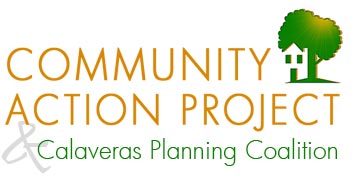project focused on sustainable land use planning.
Find out more about us >>
Historic Lode road straightening inches along
By Dana M. Nichols
February 22, 2013
Record Staff Writer
February 22, 2013 12:00 AM
SAN ANDREAS – Ranchers whose refusal to allow biologists onto their properties threatened to delay a $60 million highway project by a year and add millions to the cost have relented, Calaveras County officials said.
Biological studies and other field work required to prepare plans for the straightening of a 6-mile-long section of Highway 4 between Copperopolis and Angels Camp will proceed on schedule, officials said.
Resolving the standoff came down to the wire.
“The deadline for biological studies was today,” Calaveras County Public Works Director Tom Garcia said last Friday.
That meant that without permission to proceed, studies required to check for the presence of threatened or endangered species such as the red-legged frog or the California Tiger Salamander would have been delayed at least a year.
Such studies can only be performed at certain times because the critters spend much of the year hidden underground.
Last Friday afternoon, Garcia received word that the last property owner had granted permission following a meeting that morning with Calaveras County Supervisor Debbie Ponte.
“We had funding that could be in jeopardy if we didn’t move forward with this project,” Ponte said Tuesday.
Ponte said that in recent weeks she had met with 15 property owners who had not responded to requests for permission to study possible routes for improving Highway 4.
The section of Highway 4 in question is referred to as the Wagon Trail because it follows the alignment of a wagon road dating to the Gold Rush. Sharp curves force drivers to slow to 30 miles per hour or less in many locations.
The long-awaited improvement is intended to speed motorists on their way from the Central Valley to the vacation homes, wineries and other attractions on upper Highway 4.
The project is already expensive enough that it may take a decade for Calaveras officials to accumulate enough state and federal highway funding to get it built.
Garcia said that had property owners refused permission to conduct the necessary studies, it would have still been possible to proceed, but at a higher price.
That’s because under environmental law, project managers have the option when they can’t do a study to assume a particular endangered species is present and then do required mitigation. Garcia said that might have added another $2 million to $4 million to the bill for taxpayers.
Ponte confirmed that rancher John Tiscornia was the property owner she met with last Friday morning. Tiscornia, contacted by phone, declined to discuss the matter.
Ponte said the property owners she met with had a wide variety of reasons for not responding to the request for permission to conduct the studies. Some, she said, simply forgot to mail the paperwork. Others worried that biologists might set up camp on their property for long periods.
In fact, Ponte said, most visits for the studies will range from a day to a few hours.
“Some just wanted to be notified,” she said of the property owners’ concerns about the studies. “Some wanted to go with the person conducting the study.
“It opened up better lines of communication,” she said of the meetings she held with property owners.
Ponte said that she is planning to organize a public meeting within six weeks to answer questions of those affected by the project.
Contact reporter Dana M. Nichols at (209) 607-1361 or dnichols@recordnet.com. Visit his blog at recordnet.com/calaverasblog.
http://www.recordnet.com/apps/pbcs.dll/article?AID=/20130222/A_NEWS/302220313/-1/A_COMM02

